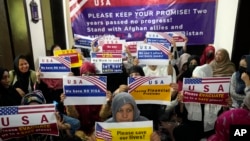The United States' program to resettle former Afghan interpreters and contractors could come to an abrupt end in a few months as the number of available Special Immigrant Visas dwindles.
Activists are urging Congress to authorize additional visas, known as SIVs, with less than 8,000 remaining amid a backlog of over 120,000 applications.
“If more visas are not authorized, the program will likely run out of visas by the end of summer, which could be a death knell for the program,” said Andrew Sullivan, director of advocacy at No One Left Behind, an organization advocating for Iraqi and Afghan SIV beneficiaries.
The U.S. has ramped up SIV processing, issuing a record 39,000 SIVs in 2023. Still, demand far outstrips supply.
Last year, the U.S. Department of State asked Congress to authorize additional SIVs. The proposal received support from some lawmakers. In July, Senator Jeanne Shaheen celebrated a "landmark victory" when an amendment authorizing 20,000 new SIVs was included in the State Department's appropriations bill.
However, it remains unclear whether the SIVs will be included in the final version of the bill, which must be approved by both the House and the Senate by March 22 to avoid a partial government shutdown.
“For two decades, the U.S. military mission in Afghanistan relied on trusted Afghan allies who stood shoulder-to-shoulder with American troops. We promised to protect them — just as they did for us; yet we are at grave risk of leaving behind many of our allies as the Taliban continue to hunt for them. We need to do more to help them and keep our promise — that’s why I secured an additional 20,000 SIVs in the bipartisan Senate-passed appropriations bill and I’ll continue fighting to get those visas included in the final package,” Shaheen told VOA in a written statement.
VOA sought comment from House Speaker Mike Johnson but has received no response.
“We are nearing the annual cap,” State Department spokesperson Mathew Miller warned last week. “We need statutory approval to raise the cap.”
Some 2½ years after the U.S. withdrew from Afghanistan, evacuations of former contractors continue amid fears of Taliban reprisals.
Taliban de facto authorities say their prescribed general amnesty protects former U.S. collaborators from harm.
"Anyone who questions the Taliban's brutality is wrong," Sullivan told VOA. “We have documented over 200 targeted reprisal killings by the Taliban.”
Since 2008, the U.S. has awarded nearly 120,000 SIVs to Afghans.
Afghanistan left out
Since the 2021 withdrawal, the U.S. government has largely excluded Afghanistan from its policy priorities. Washington refuses to recognize the Taliban regime, but also withholds support for opposition groups.
President Joe Biden's State of the Union address last week did not include any reference to Afghanistan, a topic that previously featured prominently in U.S. policy discussions.
As Biden spoke, one man shouted, "Abbey Gate, Abbey Gate," referring to the entrance to the Kabul airport, where in August 2021 a massive explosion claimed the lives of more than 100 Afghans and 13 U.S. military personnel.
Biden “may try to turn the page on Afghanistan after his incompetence cost American lives, but NOT ON MY WATCH,” Brian Mast, a member of Congress who served in Afghanistan as an army bomb disposal expert, wrote on X.
Republican lawmakers often criticize Biden's handling of the chaotic withdrawal. However, some activists fault the Republican-led House for inaction on the Afghan Adjustment Act, which seeks to offer legal paths to permanent residency for tens of thousands of Afghans admitted to the U.S. in 2021 and 2022 for humanitarian reasons.





